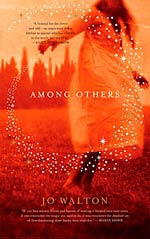
![]() Triseult
Triseult
9/23/2012
![]()
I love this book so much. It's clever and inventive and filled with the kind of literary truth that leaves you breathless. Among Others received the Nebula Award, and even beat Miéville's Embassytown to the Hugo. And you know what? Jo Walton totally deserved it.
Among Others is something new in a genre already known for invention: it's what I like to call "speculative autofiction". It features the strengths of both SF and autofiction, and each genre adds to the other to transcend either genre into something refreshing and exciting. Among Others is the story of Welsh-born Morwenna, who ends up in a boarding school in England following mysterious tragic events involving her mother and twin sister. The story is told in the form of Morwenna's diary, as she chronicles her life in this strange new environment. But Morwenna happens to see faeries, and knows how to use magic spells.
The ambiguity surrounding Morwenna's magic is a piece of intricate, subtle, and clever world-building. It's not the kind of magic that allows you to throw fireballs; as a matter of fact, it's so subtle that if you stop believing in it, it might suddenly seem like a series of fortunate coincidences. Likewise, it's not clear whether the faeries are real, or if they're the product of a hyperactive child's imagination. Yet as a fantasy system, the faeries and their magic work perfectly. They're clever and inventive, and they work on many levels. Ultimately, the title of the novel itself is a piece of similar ambiguity: it's not clear if the "others" in the title refers to faeries, or to the mundane world in which Morwenna struggles to survive.
But even without magic and faeries, Morwenna is a fascinating character. Ms. Walton wrote her with a clear, enchanting voice. She's a clever teenager, very bright but socially unwise, who doesn't grasp as much as we do about the subtleties of the world around her. Writing a believable, naive character is hard, even moreso in realistic autofiction, but here Jo Walton pulls it off perfectly. I have very little in common with Morwenna as a character, yet I felt a sense of intimacy and kinship as I read about her life. I exulted when she managed to make friends, felt a pang of sorrow when she felt sad.
A central and fascinating aspect of Among Others is the SF books that Morwenna reads. Morwenna reads a lot; at fifteen, she has read more classic SF than I have at 38. The novel is peppered with her observations on books ranging from Le Guin to Heinlein, including a few non-SF books along the way. It would have been easy for Ms. Walton to have written Morwenna's SF addiction as mere escapism from her life, but that's not the vibe I got from her. I see how SF is a huge part of how she articulates her inner world, and it helps her understand the outside world as well. It's not escape as much as a way to grasp the world and make sense of it. It's a delightful dimension of the book, and I even got a few great recommendations out of it.
Some people have criticized the book for being unrealistic in a number of character depictions, but I think those readers have missed the deeper subtleties at play. Morwenna states early in the book that her story of faeries are fiction; I believe this is key to understanding what real drama hides behind Morwenna's diary account.
But no matter your final interpretation of the story, it's an enthralling one told in a unique voice. Walton had the courage to write words that ring true, rather than just writing clever turns of phrase. When the writing is clever, it's Morwenna's own entirely, instead of a way for Walton to show off. The result is a triumph for SF, and a work of greater subtlety than many non-genre stories with similar themes.